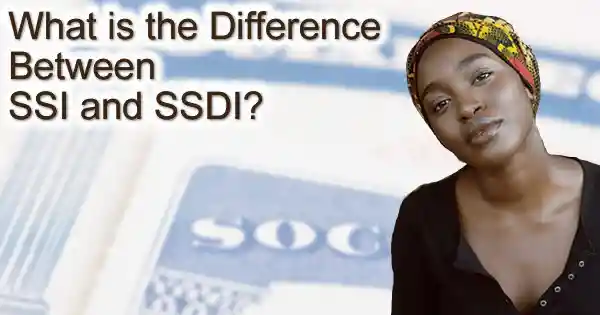What is the Difference Between SSI and SSDI?

It doesn’t matter if you apply for SSI, SSDI or both.
The Social Security Administration will consider your income and assets and decide whether your claim is for concurrent SSDI and SSI benefits when your claim is processed at Disability Determination Services.
Supplemental Security Income (SSI) and Social Security Disability Income (SSDI) are two different programs administered by the Social Security Administration to help individuals with disabilities, but most people have trouble distinguishing between the two programs. Both SSI and SSDI offer cash benefits, but while medical eligibility for disability is evaluated in the same manner for both programs, the financial eligibility requirements are quite different for SSI and SSDI, and there are other important distinctions.
What is SSI?
Supplemental Security Income provides cash benefits for food, clothing and shelter to blind, disabled and aged people who have little or no income. In order to be eligible for SSI, a person must be:
- 65 or older, blind, or disabled
- A U.S. citizen or lawful resident
- Have limited income and assets
The SSI program is paid out from general U.S Treasury funds.
You do not need to have worked a certain amount of time or paid FICA taxes. It can be quite difficult to qualify for SSI simply because the amount of income an individual can earn and still receive benefits is low. If you are an individual earning $967 (in 2025) or more per month, you will not qualify for SSI.
If you have been denied disability don’t give up! Contact a Disability lawyer at 512-454-4000 for a free consultation and get the benefits you deserve.
The monthly payment amount for the SSI program is based on the “federal benefit rate.”
This amount changes annually and in 2025 is $967 per month for individuals and $1,450 for couples. Any income you receive during the month, minus certain exclusions, can be subtracted from your federal monthly SSI payment. Most states will supplement SSI payments, but each state has its own rules and requirements. Texas administers its own supplemental payments, restricting those payments to individuals receiving institutional care paid for by Medicaid to offset that cost.
In the SSI program, income is defined as money earned, Social Security benefits, pensions, and the value of in-kind support and maintenance (ISM).
If you receive SSI and someone provides you with a place to live and meals you don’t pay for, it’s considered income and its value is subtracted from your monthly payment. ISM includes food, shelter (rent/mortgages), property taxes, utilities, and goods given as gifts, but not phone, cable, or medical expenses.
There are a few circumstances where food and shelter are not considered ISM:
- If a person lives with a spouse and minor children and no one outside the household pays for food and shelter
- If a person lives with others and pays their share of rent and food
- If a person is given food and shelter as a loan and pays back the loan
The Social Security Administration takes into account other resources when considering an applicant’s income and assets.
Countable resources are financial assets that can be converted to cash and includes stocks, bonds, and property, but not the home you live in or a vehicle that you rely on for transportation. An individual’s countable resources cannot exceed $2,000 and a couple’s assets cannot exceed $3,000.
You can apply for SSI online or make a telephone appointment.
If approved, payments begin the month you are approved. In Texas recipients of SSI automatically qualify for Medicaid to pay for hospital stays, doctor bills, prescription drugs, and other health expenses and may also be eligible for other assistance such as the Supplemental Nutrition Assistance Program (SNAP).
What is SSDI?
Perhaps the most significant difference between SSI and SSDI is that SSDI is available to disabled people who have earned work credits by working a certain amount of time and paid Social Security taxes while SSI is available to people who have not earned enough work credits or not worked at all.
SSDI is funded through payroll taxes and in order to qualify for SSDI, an applicant must meet the following basic requirements:
- You must have worked long enough and recently enough in a job where you paid Social Security taxes, usually any 5 of the past 10 years
- You must have a medical condition that meets Social Security’s definition of disability and has lasted or is expected to last at least 12 months or result in death
The Social Security Administration does not limit the amount of assets or unearned income you may have to be eligible for SSDI, or any income your spouse earns; however, the SSA does place a limit on the amount of income you can earn through work while receiving Social Security Disability benefits.
If you are able to earn “Substantial Gainful Activity” (SGA), you will not be considered disabled. In 2025 the SGA for a disabled applicant is $1,620 per month and $2,700 for a blind applicant.
Once approved for SSDI, there is a five-month waiting period before payments begin.
The amount of benefit a claimant receives depends on their earning record; a disabled person’s spouse and dependent children are also eligible for dependent benefits. Applicants may be eligible for Medicare after receiving SSDI for two years.
Can a person qualify for both SSI and SSDI benefits?
Under some circumstances, yes.
If an applicant’s income and assets are low enough to qualify for SSI, but the applicant also worked long enough to qualify for SSDI, it’s possible to receive “concurrent benefits.” This usually occurs when an applicant has not worked much or has earned low wages. For example, if an individual is approved for an SSDI monthly benefit of $500, they may also receive SSI to increase their payment to $967. In other cases, an applicant who has been approved for SSDI and is still within the five-month waiting period may receive the full monthly SSI payment of $967 in the meantime. When SSDI payments begin, the SSI payment will be reduced, or even terminated, depending upon the amount of SSDI they are approved for.

It doesn’t matter if you apply for SSI, SSDI or both.
The Social Security Administration will consider your income and assets and decide whether your claim is for concurrent SSDI and SSI benefits when your claim is processed at Disability Determination Services. Both programs apply the same definition of disability and use the same disability evaluation process.
It should be noted that approval rates for SSDI are higher for SSDI applications, conceivably because SSDI applicants are more likely to have health insurance coverage through work and have seen a doctor regularly for their medical condition.
It is difficult to get a disability determination without providing medical evidence of a disabling condition and receiving regular treatment.
Applying for Social Security Disability benefits can be a confusing and frustrating process.
Obtaining the advice and assistance of a qualified disability attorney can help you avoid unnecessary mistakes and delays and improve your chances for success.
Disability benefits are an important source of income for those who are unable to work. If you are not able to work due to accident or illness, you may be eligible for Social Security Disability or Long Term Disability benefits. If you have applied for benefits and been denied, contact the attorneys at Bemis, Roach and Reed for a free consultation. Call 512-454-4000 and get help NOW.
What is SSI (Supplemental Security Income)?
Disability offsets – Can I receive two sources of disability income at once?
How does long term disability differ from Social Security Disability?

Your Free Initial Consultation
Call now:
At Bemis, Roach and Reed, if we can't help you, we will try to find the right attorneys for you.
We offer each of our prospective clients a free no obligation one hour phone or office consultation to see if we can help you and if you are comfortable with us. We know how difficult a time like this can be and how hard the decisions are. If we can be of assistance to you and help you find a solution to your issue we will, even if that means referring you to another attorney.
Let's get you Started:
If you could provide us with some basic information about your claim we will get right back with you with a free case evaluation and schedule your Free Consultation Today.
You can also email us at: contact@brrlaw.com
Kind Words from Our Clients
“The attorneys and staff at Bemis, Roach & Reed have provided me and my husband, Jeff, with stellar advice, care, and service. They made navigating the SSDI process easy, painless, and as timely as possible. During this difficult time in our lives it was a tremendous relief to know they were on our side and keeping us updated on next steps and timelines. We also had questions about my husband’s long term disability insurance and they helped us get those questions answered and resolved without any additional fee. I highly recommend Bemis, Roach & Reed.” – Kelli G
“I needed a lawyer for my case and had googled best lawyers. They came up first on my list and decided to give them a call. From the moment I called I knew I chose the right people. They said they would fight for me and fight they did. They knew what they were doing and kept good communication throughout the process. If you need someone that will listen, understand, and fight then these are the people. HIGHLY RECOMMEND.” – Marcel L.
“I’ve had a great experience working with Bemis, Roach & Reed for my disability case. I spent two years fighting on my own, until I was informed to look for a disability lawyer. Right away, sending in questions was a breeze, and from the moment my case was accepted, everything became a major weight off my shoulders. My newest appeal was filed for me, my medical records and case history sorted for me, and I could finally focus on my appointments and treatment with a little less worry. Everything was explained to me in a way that made sense, the process was set out in an easy to understand way. And, just like that, at the beginning of July 2023, my claim was accepted!” – Sunshinemutt






